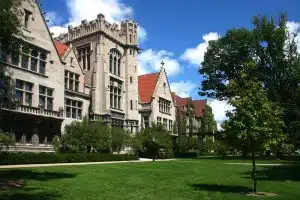Top 10 Colleges for Physics
If you’re eyeing colleges renowned for their physics programs, this guide is for you. Physics, a cornerstone of innovation, powers many of today’s technological marvels. From smartphones to space exploration, its principles are integral.
Thus, selecting a top-tier physics program can dramatically shape your career path. We’ll outline the crucial aspects of these elite programs, helping you find the one that suits you best.
Top 10 Colleges for Physics
1. Massachusetts Institute of Technology (MIT) – Department of Physics
- Location: Cambridge, Massachusetts
- Estimated Tuition: $57,600
- Graduation Rate: 94%
MIT is the top college for physics, recognized globally for its excellence. It ranks 1st in Best Global Universities for Physics by US News and World Report. With a competitive 7.3% acceptance rate, it attracts ambitious students ready for a challenge. The MIT Physics Department is a hub for innovation, offering concentrations like Physics-Mathematics and Physics-History of Science.
The program is perfect for students who thrive in rigorous academic environments. The curriculum spans from basic principles to advanced topics like Quantum Information Science. MIT also promotes active engagement through research opportunities and special programs, preparing students for groundbreaking careers in physics and related fields.
2. Harvard University – Department of Physics
- Location: Cambridge, Massachusetts
- Estimated Tuition: $51,100
- Graduation Rate: 98%
Harvard’s physics program, ranked 2nd globally, is known for its selective 7% acceptance rate. This positions it as a highly competitive option for dedicated students aiming for the pinnacle of academic achievement in physics.
Harvard offers unique concentrations like Physics-Mathematics, Physics-Astronomy, and the special Chemistry and Physics concentration. Events like study nights and “Cool Physics” sessions foster a supportive environment, encouraging students to explore physics deeply and collaboratively. With opportunities for joint concentrations and independent research, the program is ideal for those who value flexibility and a strong community.
3. Stanford University – Physics Department
- Location: Stanford, California
- Estimated Tuition: $55,500
- Graduation Rate: 96%
At Stanford, the physics program is among the world’s best, ranked 3rd internationally. With a 3.95% acceptance rate, it’s tailored for students who excel in highly competitive environments and are eager to tackle complex challenges. Hands-on laboratory experiences and research opportunities further enrich students’ learning, making Stanford a top college for physics.
Stanford’s physics department offers concentrations that span traditional and interdisciplinary fields, including Astrophysics and Human Biology. The program emphasizes quantitative problem-solving, experimental design, and effective communication, preparing students for diverse careers.
4. University of California, Berkeley (UC Berkeley) – Department of Physics
- Location: Berkeley, California
- Estimated Tuition: $15,900 (in-state); $48,500 (out-of-state)
- Graduation Rate: 94%
UC Berkeley’s physics program is globally acclaimed, ranking fourth. With a 17% acceptance rate, it attracts students determined to excel in a field known for its rigor and depth. UC Berkeley’s physics programs guide students through a spectrum of topics, from star formation to nanotechnology.
Designed for those intrigued by the universe’s fundamental laws, the program’s curriculum is rigorous. Opportunities for research with top groups prepare students for various careers. The graduate program offers specialties like astrophysics and quantum information, highlighting UC Berkeley as a top college for physics enthusiasts aiming for academic or professional excellence.
5. California Institute of Technology (Caltech) – Division of Physics, Mathematics, and Astronomy
- Location: Pasadena, California
- Estimated Tuition: $63,250
- Graduation Rate: 93.6%
Caltech’s physics program is globally ranked fifth, with an overall acceptance rate of 20%. It’s ideal for students seeking a cutting-edge, highly competitive environment focused on deep theoretical and practical insights. Caltech’s physics department offers a rich curriculum that includes theoretical and applied physics, making it a top college for physics.
Students explore everything from elementary particles to astrophysics, benefiting from interdisciplinary research collaborations. The program is designed for those passionate about pioneering scientific exploration. Activities like the Physics Club and courses on numerical solutions and communication skills equip students with a comprehensive skill set, ready for groundbreaking research and professional success.
6. University of Chicago (UChicago) – Department of Physics
- Location: Chicago, Illinois
- Estimated Tuition: $63,800
- Graduation Rate: 93%
Ranked seventh internationally, UChicago’s physics program has a 15% acceptance rate. This highly selective program is a beacon for students dedicated to mastering the complexities of physics and contributing to cutting-edge research. UChicago’s physics department offers an expansive curriculum covering General Physics, Quantum Mechanics, and more.
The program includes undergraduate research, summer internships, and support services like tutoring and career advancement. For graduate students, the focus on experimental and theoretical physics, alongside initiatives for diversity and inclusion, prepares them for influential roles in academia and beyond.
7. Princeton University – Department of Physics
- Location: Princeton, New Jersey
- Estimated Tuition: $62,400
- Graduation Rate: 98%
Princeton’s physics program, ranked ninth globally, has an extremely selective graduate acceptance rate of 4 to 5%. This program is a magnet for students who aim to lead and innovate in the field of physics. Princeton physics concentrators are poised for success in a wide array of fields, from academic research to biotechnology, making it a top college for physics.
Moreover, the department’s research spans astroparticle physics to cosmology. Inclusivity and global engagement are highlighted through activities like study abroad programs and inclusivity initiatives, ensuring students not only excel in physics but also contribute positively to a diverse scientific community.
8. Columbia University – Department of Physics
- Location: New York, New York
- Estimated Tuition: $65,500
- Graduation Rate: 97%
With a selective acceptance rate of 6.15%, Columbia’s physics program draws students who are not only academically gifted but also deeply committed to exploring the physical universe. The program is also globally recognized, ranking 11th. Columbia offers a physics major and concentration designed to equip students with a strong foundation in modern physics, mathematical techniques, and experimental skills.
The program also supports students interested in graduate studies or careers in technology. It includes core courses, elective advanced topics, and intensive laboratory work. Interdisciplinary majors like Astrophysics and Chemical Physics are also available, catering to students seeking a broad scientific education while specializing in physics.
9. University of Washington, Seattle (UW Seattle) – Department of Physics
- Location: Seattle, Washington
- Estimated Tuition: $12,600 (resident); $42,000 (non-resident)
- Graduation Rate: 84%
Ranked 14th internationally, UW Seattle offers a physics program with a diverse acceptance rate of around 50%. It’s suited for students passionate about making a significant impact in physics or related fields. As a top college for physics, UW Seattle provides comprehensive tracks in Physics, including Applied, Biological, and Teaching Physics.
These tracks are designed for students aiming for careers in research, education, or at the intersection of physics with other sciences. The program emphasizes both theoretical foundations and practical applications, from climate science to quantum systems. Additionally, its public lecture series and innovative research opportunities expose students to the forefront of scientific discovery.
10. University of Maryland, College Park (UMD College Park) – Department of Physics
- Location: College Park, Maryland
- Estimated Tuition: $9,900 (residents); $38,700 (non-residents)
- Graduation Rate: 88%
UMD College Park’s physics program, ranked 16th globally, has a 52% acceptance rate. This program is designed for students who are committed to excelling in the physical sciences. The program’s broad approach allows for customization, preparing graduates for diverse careers or advanced studies.
At UMD College Park, students can dive into a physics program that offers concentrations across the physical sciences, including innovative courses and hands-on laboratory experiences. This curriculum makes it a top college for physics, appealing to students eager to explore the complexities of the natural world.
How to Find the Best Physics College for You
Choosing the right physics program is a pivotal decision that can shape your academic and professional future. Here’s a straightforward guide to help you navigate this important choice.
1. Identify your interests within physics.
Start by pinpointing your specific interests in physics, whether it be astrophysics, quantum mechanics, or another area. Understanding what excites you about physics will guide you towards a program that aligns with your passions and goals. This step is crucial in finding a college that offers specialized courses or research opportunities in your area of interest.
When you know what you want to study, you can narrow down your search to the schools best equipped to support your ambitions. Many top colleges for physics provide a wide range of sub-disciplines, enhancing your academic experience and future career prospects. Your interest might also influence your decision on whether a program’s focus is more theoretical or applied.
2. Research the rankings and reputations of colleges for physics.
Program rankings are a helpful starting point for understanding a college’s standing in the field of physics. Rankings often reflect a combination of faculty expertise, research output, and funding. While not the only factor to consider, they provide a benchmark for comparing the academic prestige of different institutions.
Beyond rankings, investigate the reputation of the programs you’re considering. Speak with professionals in the field, attend virtual or in-person information sessions, and explore forums dedicated to physics students. A program’s reputation among peers and employers can offer insights into the quality of education and research opportunities at top colleges for physics.
3. Consider the faculty’s expertise and achievements.
The faculty’s expertise and achievements are indicative of the program’s quality. Faculty members who are leaders in their fields bring cutting-edge research into the classroom, providing students with up-to-date knowledge and valuable insights. Explore faculty profiles to learn about their research, publications, and awards.
Additionally, consider how accessible the faculty are to students. The opportunity to work closely with esteemed professors can significantly enrich your educational experience. This aspect is particularly important in research-intensive programs where mentorship is key to developing your academic and professional skills in physics.
4. Look into the research opportunities available at colleges for physics.
Research opportunities can greatly enhance your learning experience and prepare you for a career in physics. Look for programs that offer undergraduates the chance to participate in cutting-edge projects. This not only bolsters your resume but also allows you to apply classroom knowledge to real-world problems.
Consider the variety and quality of the research facilities and ongoing projects. Schools that collaborate with national laboratories or have state-of-the-art equipment provide a richer research environment. These opportunities are especially vital at colleges renowned for their physics programs, where hands-on experience is key to understanding complex theories.
5. Evaluate the curriculum and concentrations offered by physics colleges.
A curriculum that aligns with your academic and career goals is crucial. Review the courses and concentrations offered to ensure they cover the areas of physics you are most interested in. Comprehensive programs offer a solid foundation in physics while allowing specialization in areas such as computational physics or material science.
Also, assess how flexible the curriculum is for exploring interdisciplinary studies or undertaking independent research. The ability to tailor your education can significantly enhance your learning experience. This flexibility is a hallmark of top physics colleges, accommodating diverse student interests and career paths.
6. Assess the acceptance and graduation rates of physics colleges.
The acceptance rate of a physics program can indicate its selectivity and competitiveness. While a low acceptance rate suggests a highly competitive environment, it also often reflects a program’s prestige and the quality of education it offers. However, don’t let high selectivity deter you if you’re passionate about attending; prepare a strong application that highlights your interests and achievements in physics.
Similarly, a high graduation rate indicates that students are well-supported throughout their studies. It suggests effective advising, a conducive learning environment, and a curriculum that successfully prepares students for their futures. High graduation rates are a positive attribute of any program, especially in challenging fields like physics.
7. Check for financial aid and scholarship options.
Understanding the financial aid and scholarship opportunities available can significantly influence your decision. Top colleges for physics often offer generous support to attract the best students, regardless of their financial background. Investigate each school’s financial aid packages, scholarships specifically for physics majors, and grants for research or study abroad opportunities.
Don’t overlook external scholarships from scientific societies and organizations either. These can provide additional funding and are a testament to your abilities and dedication to the field of physics. Securing financial support can ease the burden of tuition costs and allow you to focus more on your studies and research.
8. Visit colleges for physics, if possible, to get a feel for the environment.
Visiting campuses can give you invaluable insights into the everyday life and culture of the institution. A campus visit allows you to see the facilities firsthand, meet faculty and students, and perhaps even attend a class or two. This experience can help you gauge whether the college’s atmosphere supports your academic and personal growth.
When visiting, pay special attention to the resources available to physics students, including laboratories, libraries, and study spaces. The physical and social environment of a campus plays a crucial role in your overall college experience, especially in a demanding field like physics.
9. Read reviews and testimonials from current students and alumni of physics colleges.
Current students and alumni can offer perspectives on the program that you won’t find in brochures or on websites. Look for forums, social media groups, or alumni networks where you can ask questions and read about others’ experiences. This feedback can provide a clearer picture of the program’s strengths and weaknesses, faculty accessibility, and the career paths graduates have taken.
Pay close attention to comments about the supportiveness of the community and the opportunities for mentorship and professional development. These aspects are crucial for your success and satisfaction in a physics program. Hearing from those who have gone through the program can guide you in making an informed decision.
10. Consider the program’s career support and alumni network.
A strong career support system and an active alumni network are invaluable resources for physics students. These networks can provide mentorship, internships, and job opportunities post-graduation. Investigate the program’s career services and how they assist students in transitioning from academia to the workforce.
Engaging with alumni can offer insights into various career paths and the applicability of the program’s curriculum in real-world settings. An engaged and supportive alumni network is a sign of a program’s quality and its commitment to student success beyond graduation.
Conclusion
Choosing the right physics program is a journey that shapes your future. Reflect on these steps to find a program where your passion for physics can thrive.
Remember, the best program for you is where your curiosity meets opportunity, setting the stage for a bright and successful future in physics. Let your quest for knowledge and discovery guide you to the college that feels like home.









































